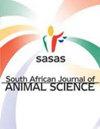添加蜂胶影响肉鸡生产性能、肠道形态和细菌种群
IF 0.6
4区 农林科学
Q3 AGRICULTURE, DAIRY & ANIMAL SCIENCE
引用次数: 2
摘要
本试验旨在研究在饲粮中添加蜂胶对肉鸡生长、肠道细菌数量、抗病毒血清浓度、肠道形态和消化酶活性的影响。使用PRISMA协议确定了2003年至2019年期间发表的40篇同行评议文章,并将其纳入该研究。数据分析采用混合模型方法,其中研究被认为是随机效应,而补充蜂胶的水平被认为是固定效应。蜂胶添加对体重(BW)和平均日增重(ADG)均有二次响应,但对平均日采食量(ADFI)无影响。添加蜂胶可显著提高饲料系数(FCR),且与添加量呈显著线性关系。饲粮添加量在256 ~ 262 mg/kg之间时,日增重和最终体重最大。蜂胶的补充有降低死亡率的趋势。蜂胶对血清抗病毒药物浓度、肠道细菌数量及肠道形态无明显影响。消化酶中只有蔗糖酶随蜂胶添加量的增加呈线性增加。由此可见,添加蜂胶对肉鸡生长性能有显著的促进作用,且效果呈剂量依赖性。这可能部分是由于蔗糖酶活性的提高和其他与蜂胶营养成分有关的因素。因此,有必要进一步研究蜂胶的特定生物活性化合物。本文章由计算机程序翻译,如有差异,请以英文原文为准。
Propolis supplementation affects performance, intestinal morphology, and bacterial population of broiler chickens
A meta-analysis was conducted to examine the effect of supplementing the diet of broiler chickens with propolis on growth, bacterial population of the intestine, antiviral serum concentration, intestinal morphology, and digestive enzyme activities in broiler chickens. Forty peer-reviewed articles that had been published between 2003 and 2019 were identified using the PRISMA protocol and included in the study. Data were analysed with mixed model methodology, in which the studies were considered random effects, whereas the level of supplemental propolis was considered a fixed effect. Responses to propolis supplementation in bodyweight (BW) and average daily gain (ADG) were quadratic, but average daily feed intake (ADFI) was not affected. Propolis supplementation improved feed conversion ratio (FCR) significantly as a linear function of the level of supplement. The optimum level of supplementation was between 256 and 262 mg/kg feed and produced maximum ADG and final BW. There was a tendency for mortality to decrease because of propolis supplementation. Propolis had no detectable effect on serum antiviral concentration, intestinal bacterial population or intestinal morphology. Among digestive enzymes, only sucrase increased linearly as propolis was increased. Thus, supplementation with propolis increased the growth performance of broiler chickens positively and the effect was dose dependent. This may have been partly because of an improvement in sucrase activity and other factors related to the nutritional content of propolis. Future study to evaluate specific bioactive compounds of propolis is therefore warranted.
求助全文
通过发布文献求助,成功后即可免费获取论文全文。
去求助
来源期刊

South African Journal of Animal Science
农林科学-奶制品与动物科学
CiteScore
1.50
自引率
0.00%
发文量
39
审稿时长
>36 weeks
期刊介绍:
The South African Journal of Animal Science is an open access, peer-reviewed journal for
publication of original scientific articles and reviews in the field of animal science. The journal
publishes reports of research dealing with production of farmed animal species (cattle, sheep,
goats, pigs, horses, poultry and ostriches), as well as pertinent aspects of research on aquatic
and wildlife species. Disciplines covered nutrition, genetics, physiology, and production
systems. Systematic research on animal products, behaviour, and welfare are also invited.
Rigorous testing of well-specified hypotheses is expected.
 求助内容:
求助内容: 应助结果提醒方式:
应助结果提醒方式:


